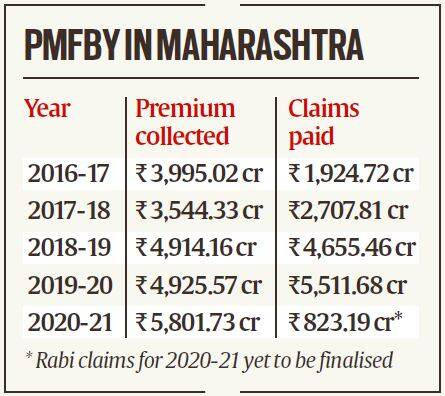Maharashtra is the latest state to threaten to withdraw from the Pradhan Mantri Fasal Bhima Yogna (PMFBY) if changes to it are not carried out.

A look at the issue, and what other options are available for the state if it withdraws.
What is PMFBY?
Introduced in the 2016-17 kharif season, PMFBY is a central-state scheme which aims to cushion farmers against crop loss. The central and state governments pay more than 95 per cent of the premium amount while the farmer bears 1.5-5 per cent of the premium. As extensive usage of technology is used to settle the claims of farmers within a stipulated time period, farmers are required to fill loss reports online which are validated by insurance companies before the compensation amount is paid directly in their accounts.
Prior to 2020, the scheme was mandatory for farmers who availed institutional finance, but that was changed and made voluntary for all farmers.
Maharashtra has consistently seen a large number of farmers opting for the scheme, even when it was non-mandatory for non-loanee farmers. Till 2019-20, over 357 lakh farmers had opted for the scheme and over 162 lakh farmers had received a total compensation of Rs 10,048.67 crore.
Why PMFBY criticised?
Since the beginning, farm leaders across the state have criticised the scheme for various reasons. One of the main arguments against it is that it helps insurance companies more than the farmers. Farm leaders claim insurance companies have made windfall gains at the behest of the public exchequer and farmers.
Story continues below this ad
Delayed payouts and denial of claims are other common complains against insurance companies.
On their part, the companies point out the nature of the insurance allows for payment only when there is a loss. Also, over the last few years, they have said their payouts have been more than the premium collected, making the scheme non-viable for them.

Last year, the state’s agriculture commissioner Dheeraj Kumar had officially lodged complaints against a particular insurance company for its failure to pay farmers on time. This was in regard to the compensation for crop loss of kharif 2020, which was delayed inordinately. Kumar, in his letter, said the company in question had given the lowest payout of the last few seasons, while the premium collected was the highest. His letter also pointed out that insurance companies had hoodwinked farmers by not establishing taluka-level offices or call centres, and also failed to educate farmers on the correct methodology for reporting claims.
Farm leaders also added to the chorus, asking for action against the companies.
Story continues below this ad
The insurance companies were also blamed for not conducting enough crop cutting experiments (CCE), which measure the total loss experienced by the farmers.
Which states have withdrawn from the scheme, and why?
Gujarat, Bihar, West Bengal, Andhra Pradesh, Telangana and Jharkhand have opted out of the scheme.
The Lok Sabha’s Standing Committee on Agriculture had noted in its report of August 2021 that these states decided to opt out because of low claim ratio and financial constrains. “Financial constraints of the state government and low claim ratio during normal season are the major reasons for non-implementation of the scheme by these states. However, they have implemented the schemes with lower benefits than PMFBY from their own resources and without contribution from central government,” the report stated.
Interestingly, Gujarat is a BJP-ruled state, while in Bihar, the party is in power along with the JD(U).
Story continues below this ad
What changes has the Maharashtra government proposed?
One of the major changes the state government has proposed, is a share in premium collected from insurance companies during a non-payout or normal year. Called the Beed model, after the district where it was first experimented during kharif 2020, under this model, insurance companies provide cover to an extent of 110 per cent of the premium collected. In case the compensation amount exceeds this, the state government will bridge the amount. In case the compensation amount is less than the premium collected, the company will refund 80 per cent of the funds to the state government and keep 20 per cent for its administrative expenses.
The model was implemented by the government-run Agricultural Insurance Company.
During his meeting with Prime Minister Narendra Modi, Maharashtra Chief Minister Uddhav Thackeray had sought implementation of the Beed model. However, the Centre has not given its nod for the same till date.
The state has also sought more accountability from insurance companies. Farm leaders have asked for necessary infrastructure to be set up while implementing the scheme, and the usage of technology to help eradicate human interference.
Story continues below this ad
Newsletter | Click to get the day’s best explainers in your inbox









































